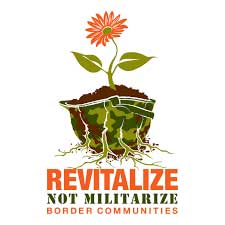From Draft NOtices, April - June 2019
— Pedro Rios and Christian Ramirez

In an unprecedented action to sidestep Congress’ power over budgetary matters, this February President Trump declared a national emergency to access war funds to build a border wall. Possibly an unconstitutional act, Trump insists on fabricating a crisis that relies on violence at its core, and which is accentuated by white supremacist motives.
Violence fueled by racial hatred is the legacy of how the U.S.-Mexico border was defined. In 1846, the U.S. war of aggression against Mexico ended with Mexico surrendering half of its territory to the United States in 1848. Since then, the borderlands continue to be contested terrain, marked by cowboy justice, lynching of Mexicans, dispossession of land, and state-sanctioned violence. But border communities must not accept violence as part of their daily life, let alone state-sanctioned violence.
Trump’s wargame mentality is similar to what has driven bipartisan border policy-making for decades. The dystopic future to which we should not become accustomed is upon us. In recent months, children have died under Border Patrol custody, dangerous concertina wire now drapes hundreds of miles of border wall next to residential neighborhoods, thousands of armed military troops are part of the enforcement theater, and paramilitary border guards enjoy little to no accountability when they engage in altercations that leave migrants dead.
Normalizing violence is part of a low-intensity conflict strategy used for social control. It is what makes it acceptable for Border Patrol agents to one day be giving out good citizenship awards at local elementary schools, and the next day be hitting someone over the head with a baton. The theory holds that violence becomes an acceptable part of the enforcement landscape, such that border residents stop seeing it as something to be questioned. So, when an egregious incident occurs involving an agent of the state, the prevailing conclusion is the victim of the violence must have deserved it. The victim becomes criminalized and the beating, torture, or death, justified. The state actor, in this case, the border agent, is absolved of any culpability because it doesn’t fit the storyline the state would want to portray as normal.
The normalization of violence has a collective impact. Over the past several months, Customs and Border Protection (CBP), part of the Department of Homeland Security (DHS), has staged riot drills at various ports of entry. In this show of force, CBP shuts down the port of entry as hundreds of border agents line up in tactical gear. They throw flash-bang grenades, smoke bombs, and practice yelling commands as if confronting crowds of people.
For what purpose all of this theater? When announcing the national emergency on February 15, Trump talked about an “invasion of our country, with drugs, with human traffickers, with all types of criminals and gangs.” CBP then, the largest law enforcement agency in the country, is deferential to a president with despotic tendencies and dangerously plays the role of defender of the border with no real threat present.
The violence is also meant to inflict collective punishment for the purpose of shaping public opinion about the migrants traveling in caravans from Central America. As goes the fallacious narrative, “They deserve this because they are criminals”; which the U.S. government then uses to evade its responsibility of respecting international agreements on asylum because, again, it must protect its borders.
Ironically, the U.S. government’s decades-long meddling in Central America has also caused migration. The low-intensity conflicts it bankrolled in the 1970s, 1980s, and 1990s left political and economic vacuums exploited by despotic governments and organized crime. Violence has pushed people to migrate because they are left with no other choice, and the United States government is complicit in this.
And as they arrive at the border, they are met with tear gas and border walls that push many to their deaths. We must not permit violence to continue to define our future. Human decency must prevail if we are to determine for ourselves how our communities, and those who pass through them, can live decent, just lives.
You can help by organizing in your communities and pressuring your member of Congress to conduct DHS oversight hearings and stop funding Trump’s deportation and militarization machine. Now is the time to defund hate.
Pedro Rios is the Director of American Friends Service Committee's U.S.-Mexico Border Program. Christian Ramirez is a labor and human rights advocate.
This article is from Draft NOtices, the newsletter of the Committee Opposed to Militarism and the Draft (http://www.comdsd.org/).





